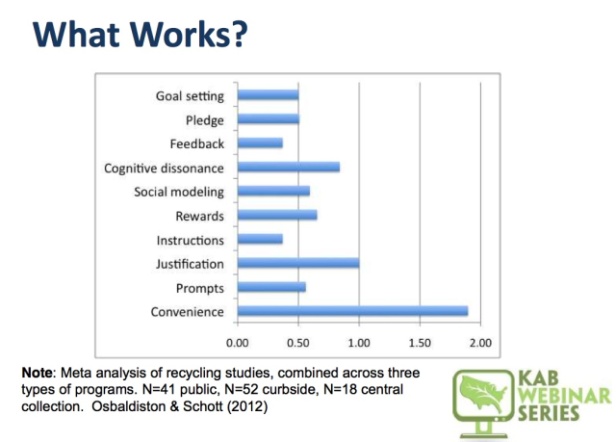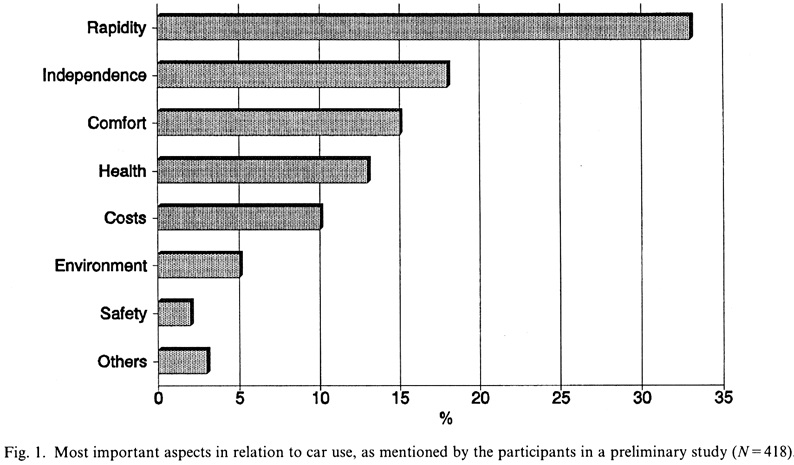At the Tipping Point conference in Melbourne last week I showed the following slide, which showed the factors people used to decide their mode of transport in a Dutch town, noting that speed slew every other consideration, including safety and comfort.

Source: Tertoolen, G. et al (1998) Psychological Resistance Against Attempts to Reduce Private Car Use, Transportation Research-A vol 32(3), pp171-181
I wondered if anyone had done a similar study into people’s decision-making around waste. Serendiptously I just stumbled upon this graph, which compares the effect of various methods used to improve household recycling. These two graphs are really about quite different things, but it’s interesting that convenience (which is similar to speed) won hands down.

Source: Osbaldiston, R., & Schott, J. (2012). Environmental sustainability and behavioral science: Meta-analysis of pro-environmental behavior. Environment and Behavior, 44, 257-299
The message: to change behaviour, get the system right (with an eye to speed and convenience) before we even begin to think about marketing.
Convenience slays every other factor

HI Les
if you haven’t come across Elizabeth Shove’s work on social practice theory I think you would find it very informing. Both comfort and convenience figure highly on why certain behaviours become embedded practices that are difficult to change without consideration of the systems that support them. I wouldn’t think there would be any surprises on the high convenience aspect of waste – that’s what household waste services and infrastructure are based on – a model that the NSW government is just about to throw 100s of millions of dollars at. Unfortunately I predict that providing infrastructure and services to increase recycling will not lead to a reduction in waste creation. That requires a different approach – but I hope I’m proven wrong!
Hi Jenny..great to hear from you! I wasn’t aware that the NSW government was planning to through 100s of millions at anything environmental! Can you tell me more?
Yes, agreed, getting the system right is critical to change Les. I call it handholding; i.e. making it easy and convenient to enable the participant to rethink. Throw in saving money (justification) and we start to see implementation.
Marketing the early case studies, particularly if the success story is about someone who may influence within a group only then becomes important.
If we achieve all this and the change becomes normal, progress is made.
Passion, subject knowledge, planning, thinking outside the box all needs to come together at the beginning..
Ah here it is:
On 23 February 2013, NSW Environment Minister Robyn Parker announced the state’s new ‘Waste Less, Recycle More’ Waste Resource and Recovery Initiative – a five-year, $465.7 million plan intended to transform waste and recycling in NSW.
http://www.sustainabilitymatters.net.au/articles/59090-NSW-residents-encouraged-to-waste-less-recycle-more
The more things change eh???????? Hi Les and Jenny, long time no see. I have to agree that I spend enormous amounts of time attempting to make things easy and accessible and convenient, and I share Jenny’s concerns that a convenient system has a negative impact on behaviour in a waste/consumption sense. However, as I now live in northern NSW, the convenience of having regular recycling and garden organics collections, as well as very well set-up waste management facilities (drop-off) in regional townships is now the norm, whereas it used to be throwing everything into a black hole on the farm or the nearest gully…. all for free. It’s been a huge cultural change, but it still focusses on disposal, so the next step really is (and haven’t we been on about this for forever??) …….why so much in the first place and what can we do to cut-back?? Not so easy – no bins to play with, no instant personal gratification or reward other than saving money eventually……and is that enough??
Hi Lynda, Lovely to hear from you. UP in northern NSW eh (where abouts)? Sounds steamy and tropical. I’m in Bulli near Wollongong..loving having a few nice summer days that aren’t blighted by tornadoes or endless rain or heat waves (missed the Russian meteor though..that was lucky).
Call me an idiot, but I’ve never really understood how people could consume much less in volume than they consume now. Of course there is a lot of packaging, and there are good works happening to bring that down a bit (no plastic bags in Aldi), but still, I can’t see people going back to the 1950s, or the 1850s. Anyway most packaging compresses down to nothing in landflils…which are a great resource for future centuries. There really is a puritan drive in so much environmental discourse…“Health promotion has been defined as the business of making people live miserably so that they can die healthy.”..much the same could be said for a lot of environmental education I think. Anyway it is cool that rural towns have recycling services! Good on all those hard working waste managers who brought it about. Anyway great to hear from you. Best wishes – Les P.S. Do you want to join my Changeology discussion group on LinkedIn..it’s at http://www.linkedin.com/groups/Changeology-4895933/about